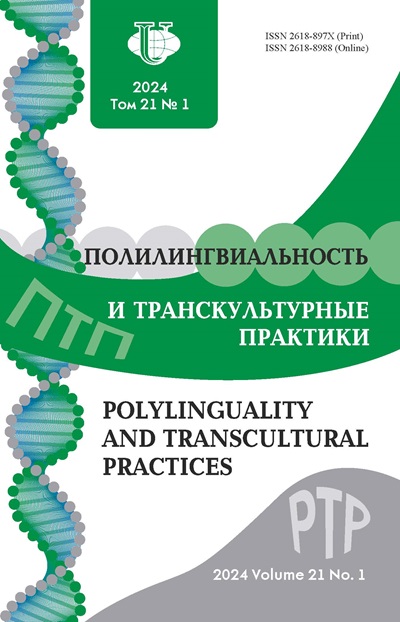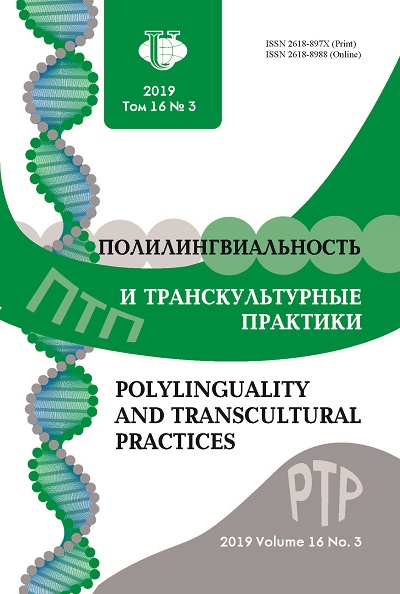“What is Your Good Name?”: on Translating Multicultural Literature
- Authors: Rogovets A.S.1
-
Affiliations:
- Lomonosov Moscow State University
- Issue: Vol 16, No 3 (2019)
- Pages: 406-414
- Section: THEORY AND PRACTICE OF TRANSLATION
- URL: https://journals.rudn.ru/polylinguality/article/view/21829
- DOI: https://doi.org/10.22363/2618-897X-2019-16-3-406-414
Cite item
Full Text
Abstract
The article discusses distinguishing features of speech etiquette in Indian English and certain aspects of its translation into Russian. The relevance of this research topic is determined by the current spread of English as an international language and by the emergence of the World Englishes paradigm. In India there are a lot of cultural conventions that do not have English equivalents and, thus, cannot be expressed adequatelyby means of the English language. As a result of the language contact, Indian English has got an impact on its linguistic setting from Hindi and other regional languages. This linguistic transfer from Indian languages can be seen at various levels, including the use of politeness formulas. In this article the focus is made on the politeness formula “What is your good name?”, which is a polite way of asking someone’s name. This etiquette question is one of the most common Indian English politeness patterns, generalized all over India. The article analyzes the etymology of this expression and explains why it is frequently encountered in the speech of Indian English users, as well as to show the important role of such an analysis in overcoming translation difficulties.
About the authors
Anastasia S. Rogovets
Lomonosov Moscow State University
Author for correspondence.
Email: vandervierenn@gmail.com
Postgraduate Student, Department of Foreign Languages Teaching Theory of M.V. Lomonosov Moscow State University
31 Lomonosovsky Avenue, Bldg. 1, Moscow, 119192, Russian FederationReferences
- Tolkachev, S.P. 2003. Mul’tikul’turnyj kontekst sovremennogo anglijskogo romana [Multicultural context of the contemporary English novel]: dis. … Doctor of Philology. Moscow. 381 p. Print. (In Russ.).
- Proshina, Z.G. 2014. Distinktivnye priznaki variantov anglijskogo yazyka, nerodnogo dlya ego pol’zovatelej [Distinctive Features of Non-native Varieties of English]. Vestnik Cherepoveckogo gosudarstvennogo universiteta, 56 (3): 123—128. Print. (In Russ.).
- Bekisheva, Y.V., and S.S. Il’ina. 2018. “Terms of Address in Hong Kong Variety of the English Language” [Based on Analysis of “A Dictionary of Hong Kong English”]. Polylinguality and Transcultural Practices, 15 (4): 501—517. (In Russ.).
- Formanovskaya, N.I. 1989. Rechevoj ehtiket i kul’turao bshcheniya [Speech Etiquette and Communication Culture]. Moscow: Vysshaya shkola. Print. (In Russ.).
- Sternin, I.A., T.V. Larina, and Sternina M.A. 2003. Ocherk angliiskogo kommunikativnogo povedeniya [Study of English Communication Behavior]. Voronezh: Istoki. Print. (In Russ.).
- Sailaja, P. 2009. Indian English. Edinburgh: Edinburgh University Press.
- Mehrotra, R.R. 1998. Indian English: Texts and Interpretation. Amsterdam: John Benjamins.
- Nihalani, P., Tongue R.K. and Hosali P. 1979. Indian and British English: A Handbook of Usage and Pronunciation. New Delhi: Oxford University Press.
- Firsova, N.M. 2013. Ispanskij rechevoj ehtiket [Spanish Speech Etiquette]. Moscow: Librokom. Print. (In Russ).
- Bo, W. 2014. Rechevoj zhanr blagodarnosti v russkom yazyke [Speech Genre of Gratitude in the Russian language]. PhD dissertation. Moscow. 178 p. (In Russ.).
- Alpatov, V.M., Kryuchkova T.B. 1980. “O muzhskom I zhenskom variantah yaponskogo yazyka” [About the Men’s and the Women’s Version of the Modern Japanese language]. Voprosy yazykoznaniya, 3: 58—68. Print. (In Russ.).
- Kurchenkova, E.A. 2012. “Angliiskii yazyk v Indii: istoriya i aktual’nye problem” [English in India: the History and Actual Problems]. Mir nauki, kul’tury, obrazovaniya, 1 (32): 388—391. Print. (In Russ.).
- Kachru, Y. 1992. “Social Meaning and Creativity in Indian English Speech Acts” in Language, Communication and Social Meaning, Georgetown University Round Table on Languages and Linguistics. Washington DC: Georgetown University Press.
- Proshina, Z.G. 2010. “Variantnost’ anglijskogo yazyka i mezhkul’turnaya kommunikaciya” [Varietes of English and intercultural communication]. Lichnost’. Kul’tura. Obshchestvo, 12 (2): 242—252. Print. (In Russ.).
- Proshina, Z.G. 2017. “Translingualism and its Application”. RUDN Journal of Language Education and Translingual Practices, 14 (2): 155—170. Print. (In Russ.).















